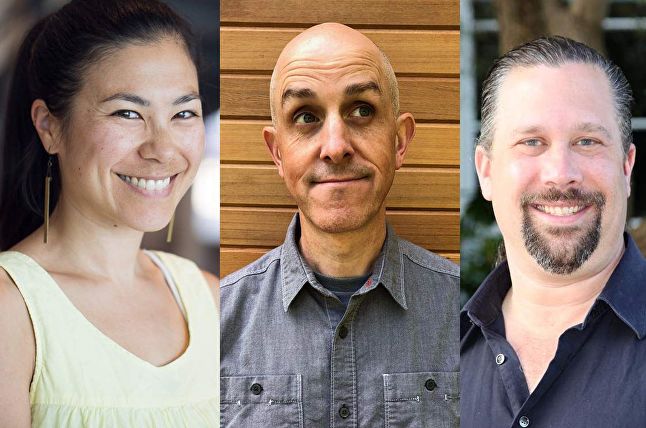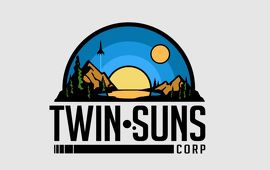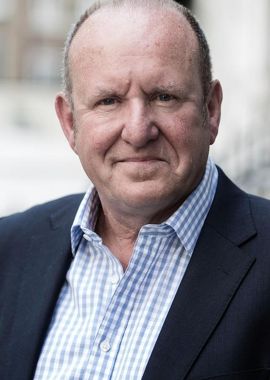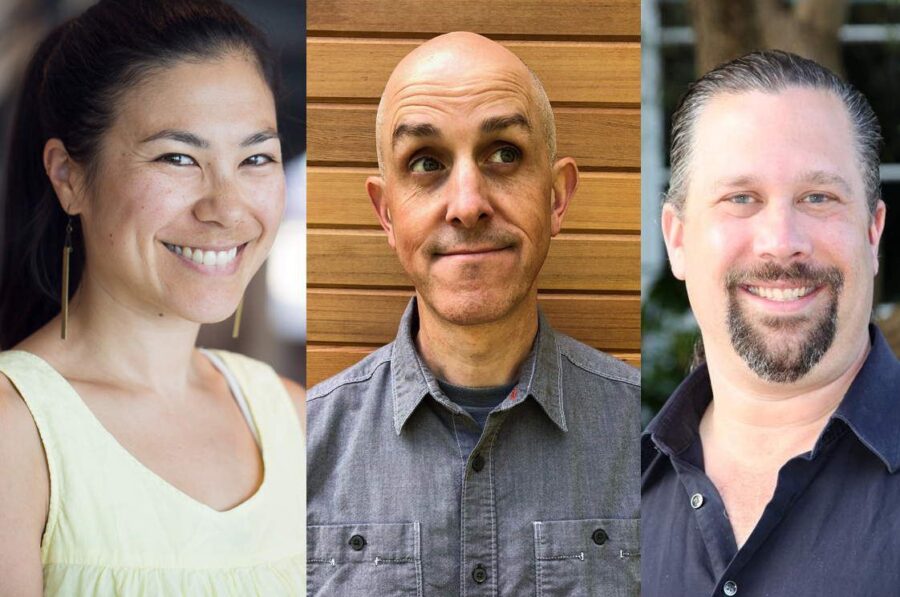For Tim Longo, starting his own studio was an opportunity to approach AAA game development differently.
The CEO and co-founder of Twin Suns Corp is a veteran of games development and has worked as creative director on some huge brands, including Tomb Raider, Star Wars and Halo games.
And just last month Longo founded his own studio, backed by investor Hiro Capital and 1UP Fund, called Twin Suns Corp. The AAA studio already boasts some big names, including Hitman 3 executive producer Forest Swartout Large and Gears of War producer Jeff Morris.

The Twin Suns Team (Left to Right): Forest Swartout Large, Tim Longo, and Jeff Morris
“We’re hungry for something new and exciting, and take on some risk and do something different,” Longo tells GamesIndustry.biz.
“A lot of the team are a bunch of veterans who have come together Voltron-style. And we’ve all worked with other people’s big IPs. But I think the challenge ahead of us — which we’re excited about but also immediately humbled by — is starting our own franchises. For me it’s been 25 years, and we’ve learned so much working with other people’s IPs. It just felt like it was time to trailblaze ourselves and venture forth and see what we could do with those learnings.
“To be transparent, we’ve had successes and failures over those years. As many people have. We’re coming at it with some humility, so it is hard to talk about yourself in these interviews. But the team is excited to make our own experiences.”
Investor Hiro Capital doesn’t usually back start-ups, instead focusing on Series-A or Series-B funding for teams a little further along. But the opportunity to back a group like Twin Suns was not something the company could pass up.
“We will never ignore an opportunity in a start-up, which is not really a start-up,” says Hiro’s co-founding partner Ian Livingstone. “Here is an opportunity to invest in a team of accomplished veterans, and leverage their decades of experience and recognition in a market that is still growing, which is AAA games. To be able to work with these veterans of success is an opportunity not to be missed.
“So you can call it a start-up, but it’s not really a start-up in the sense that it’s not new kids on the block. This is a very experienced studio, albeit new people coming together. But they’ve all worked with each other in some capacity over time. So they’re not at the starting gate, they’re half-way to the finishing line.”
“Here is an opportunity to invest in a team of accomplished veterans, and leverage their decades of experience in a AAA games market that is still growing”
Ian Livingstone, Hiro Capital
It’s true that this is a team who have, over the years, collaborated before. Even Livingstone and Longo have worked together previously on the Tomb Raider franchise. But this situation is different, as Longo and his team are now without the safety net and support of a Square Enix or Microsoft.
“It can be quite hard going from a corporate culture to one where you’re in control of your own destiny,” Livingstone acknowledges. “But it is hugely exciting. This team has been doing it for other people for so long, and anyone of that kind of skill and expertise will want to reap the rewards of their own endeavor. I know they’re fully motivated to perform and execute better than they would have done for any corporate entity.”
Longo adds: “It’s very much like getting the band back together. Taking Ian’s point, it’s a start-up but it’s not a start-up. We are falling right back into what we are familiar with. But there isn’t this other element of process and red tape. I have seen that twinkle in people’s eyes as they started to get going. The people that I’m working with, we’ve shipped multiple games together but there’s something different about it.
“As we come upon a challenge or a question or something we’re troubleshooting, I can see people having to unlearn how we approach problem solving, whether that’s design, artistic or creative challenges… people are realising they don’t have to think this way.”
He continues: “The team is really the key here. We talked to Hiro. We have a game idea. We have places we want to go creatively. But the first slide in the deck is the team slide. That is really what we are most excited about. The chance to work together again, while bringing in fresh faces.”
That last element is something else that Longo hopes he can overcome now he’s not part of a major publisher-owned developer — the ability to bring in new people with different perspectives.

Twin Suns wants to avoid getting too big
“We have prioritised, and Forest Swartout Large, who is our COO, is key to this… the industry needs fresh perspective on games development. The industry is in a rough spot right now, and there’s some dysfunctionality going on in the way that representation works. For us, we have talked a lot about culture and who we bring in. We need better perspectives of equity and fairness, etcetera. If you can bring in fresh perspectives, and people who have maybe not been given the same opportunities in the past, that will actually make the game better, the team better, the culture better and stronger. That’s one learning coming from a life of having to break out of that problem that the industry is in right now. It’s important to us that we’re trying to learn from that.”
This is something that is becoming increasingly important, particularly with COVID-19 lockdowns bringing in even more players to games than ever before. But also, Longo says, COVID has helped studios attract a broader range of talent.
“In terms of COVID and that uptick in audience, every gamer should see themselves in the games they play,” he says. “Twin Suns wants to enable that to happen. The focus is to have characters in games be representing the players who are playing them.
“We are going to be primarily dispersed development across the globe. We are going to have people in most of the time zones on the planet. So we are now trying to figure out the actual logistics of some of that. We will have people in Europe, in Singapore, in multiple States of the US. That’s one of the ways of thinking out of the box. There are no boundaries there. We are just embracing it. And we’ll do that post-COVID. That’s another exciting and terrifying step.”
Better representation and the ability to approach challenges differently are two of the exciting parts of going independent for Longo, but there are also some practical things he wants to make a part of Twin Suns from the start. That includes making sure there’s plenty of time spent on prototyping and on polish.
“In my pitch deck, and in our initial milestone planning and scheduling, one of the things I try to make a big point of is that our schedule has a longer pre-production than a lot of other games,” Longo explains. “That’s part of how we think. It’s about keeping the team smaller for longer, and we are going to be in that scrappy mode for longer than we’re used to.

Ian Livingstone, Hiro Capital
“We have all been on projects where the pre-production and concept phase was too short because of production. We want to combat that by keeping the team smaller for longer. We want to find that fun and make sure we have those prototypes. They’re going to be ugly, they’re going to be grey box, they’re going to be quick and dirty, and they’ll be throwaway, too. You prototype, you throw it away, and then you build the real version when you know what the core is.”
He continues: “The other part of my pitch is that, towards the end of the game, we section of a portion of time that we just call ‘polish’. A lot of times, that is mushed together in production, and you’re just going as fast as you possibly can and it just gets woven in. We are going to push to end the core development at a certain point, and basically reserve a chunk of time that is just for polish.
“We have successfully done that one and a half times in the past, and we’ve seen it work. That’s something Forest was able to do with Hitman 3, as I understand it. So we need to protect the time at the beginning, but we also have to protect time at the end, where pencils are down and you’re just focusing on polishing and fixing the things that aren’t quite working, rather than keeping adding features.
“In the past it’s been: “Do as much as you can until they say you can’t”. No, don’t do that. Make sure you have that space for that last 10%. Prototyping and polish are both the hardest 10% of development.”
“The industry is in a rough spot right now, and there’s some dysfunctionality going on in the way that representation works
Tim Longo, Twin Suns
Longo mentioned keeping the team small. He’s worked with some big AAA teams in the past, including Crystal Dynamics and 343 Industries. Twin Suns says it’s working on a AAA game, so is there an expectation that this company will swell to hundreds of staff?
“We are going to be careful about that,” he says.
“One of the learnings and mistakes we’ve made ourselves, and also experienced at other places, is making your eyes bigger than your stomach. We are ambitious, we are going for the same high quality that we’ve made in the past, but we are going to be more focused. At least with this initial project. It’s not going to be a kitchen sink perspective, where we are putting a bunch of different experiences in. We are not talking breadth, we are talking depth.
“So we are probably going to peak at being a medium-sized developer. We don’t want the studio to be super huge. There is a point where you get to when a team is too big, where — which we’ve learnt over the years — you start losing velocity and people’s connections to each other, the creative vision and the project itself. We are really fighting the desire to go too big. We are trying to bring people in who are multi-faceted, multi-talented, people who will wear many hats.”
Livingstone adds: “When people ask me about the three most important things about a game, I always say ‘gameplay, gameplay, gameplay’. You don’t have to have the most amazing graphics to sell lots of games these days. You don’t have to have the best technology. But you do have to have gameplay. Valheim is a team of five, and you can see what they accomplished. There is an opportunity to monetise global audiences at scale through gameplay and good business.”
Longo concludes that he expects the journey from here to be hard, but that the team is hungry and motivated to overcome whatever comes next: “As Ian says, we are a gameplay-focused studio. We’re not going to be a technology studio. We’re going to use the Unreal engine, which will allow us to get going quickly. We have been prototyping since week one. That way we can fail fast and learn from those, find the gold and focus on the things that are working. It is easy to say, hard to do stuff. I am speaking like we’ve got it all figured out, but we’ve not. We are going to stumble. But if we focus in the right areas, we will navigate through it.”
GamesIndustry.biz
Source link
Related Post:
- Shadow of Tomb Raider's PS5 and Xbox Series patch tested • Eurogamer.net
- Tomb Raider: Angel of Darkness remake shows off Lara in jeans
- Shadow of the Tomb Raider Patched to Run 4K, 60fps on PS5
- From The Creator Of Tomb Raider, Dream Cycle Is A New 'Ever-Growing' Adventure Game Coming Soon
- Shadow of the Tomb Raider gets surprise update that adds 4k support in 60fps on PS5 • Eurogamer.net
- Ghost Recon’s 20th anniversary includes a Tomb Raider crossover in Breakpoint
- Final Fantasy Brave Exvius Reveals Final Fantasy VII Remake & Tomb Raider Crossovers
- Rise Of The Tomb Raider Xbox Exclusivity Said To Be Have Been Worth $100 Million
- Tomb Raider’s official cookbook includes the world’s fanciest beans on toast
- Hitman Sniper: The Shadows interview: Dominic Allaire and Simon Doongoor discuss creative killing and introducing new characters to the series | Articles
